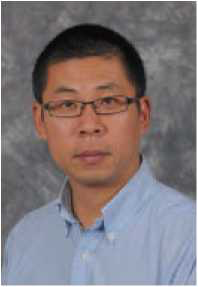Yu (Michael) Zhong, Ph.D. *
'Mechanical and Materials Engineering, Worcester Polytechnic Institute
EXTENDED ABSTRACT: Due to their promising mechanical properties, the Al-Co-Cr-Fe-Ni system has been one of the most thoroughly studied systems in high entropy alloys (HEAs). However, predicting phase stabilities and mechanical properties in this system with a complete composition range could be challenging, mainly based on experiments. Therefore, the current work developed a novel hybrid modeling approach, combining high-throughput CALPHAD, DFT, and ML to quickly investigate the phase stabilities and mechanical properties of single FCC and BCC phases. This hybrid modeling approach includes three sections:
1) HT-CALPHAD modeling of Al-Co-Cr-Ni-Fe system with FCC and BCC phase.
2) High-throughput DFT and ML modeling on elastic properties of Al-Co-Cr-Ni-Fe systems.
3) Modeling of temperature-dependent elastic properties in Al-Co-Cr-Ni-Fe systems.

Dr. Yu Zhong is an Associate Professor in Mechanical Engineering at Worcester Polytechnic Institute (WPI). He received his Ph.D. from Penn State University (2005). After a short¬term working as Research Associate, he joined Saint-Gobain High-Performance Materials Research Center in Northborough, MA. He had built up his career there as an internal technical consultant focusing on applying thermodynamics and kinetics to various R&D projects. In 2013, He moved to Florida International University (FIU) as Assistant Professor and joined WPI in 2017. Dr. Zhong received the TMS FMD Young Leaders Professional Development Award in 2016 and the ONR summer faculty fellowship in 2015, 2016, and 2017. He has more than 65 peer-reviewed journal papers published/accepted, 2 book chapters, and 2 patents. His research is currently supported by the Department of Energy (DOE) National Energy Technology Lab (NETL), Nuclear Energy University Program (NEUP), Solar Energy Technology Office (SETO), National Science Foundation (NSF), American Chemical Society (ACS), and Advance Casting Research Center (ACRC).